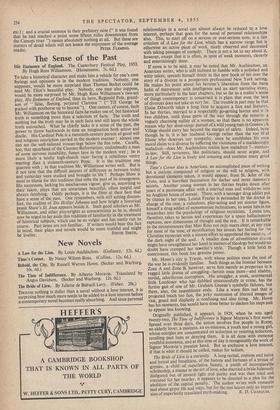New Novels
The Time of Indifference. By Alberto Moravia. Translated by Angus Davidson. (Seeker and Warburg. 12s. 6d.) The Bride of Llew. By Juliette de Bairacli Levy. (Faber. 20s.) THOUGH nothing is duller than a novel without a love interest, it is surprising how much more needs to be added to a love interest before a contemporary novel becomes really absorbing. And since personal relationships in a novel can almost always be reduced to_ a love interest, perhaps that goes for the novel of personal relationships also. This, to start off on a serious or over-serious note, is a fair criticism of A Law for the Lion, which has a narrow range but is otherwise an active piece of work, nicely observed and decorated with taking passages of comedy. There is not a lot to say about it, however, except that it is often, in spite of weak moments, cleverly- and entertainingly done.
If more is to be said, it may be noted that Mr. Auchincloss, an American writer, who is still inclined to fumble with a polished and witty talent, spreads himself thinly in this new book of his over the story of a divorce in a prosperous professional New York setting. He makes his point about his heroine's liberation from the mere habit of matrimony with intelligence and an alert narrative irony, more particularly in the later chapters, but so far as a realist's sense of things contemporary is concerned it is plain that even the best of divorces does not take us very far. The trouble in part may be that Eloise Dilworth takis a long time to acquire a face and features. In her thirties, married to a respectably go-getting lawyer and w two children, until three parts of the way through she remains a vaguely charming nullity of a woman, so that there is no apparent reason why her demi-vierge pursuit of a wild young man in Greenwich Village should carry her beyond the margin of safety. Indeed, bore though he is, it is her husband George rather than the too fil al Eloise who deserves our sympathy, since he establishes his own moral claim to a divorce by suffering the visitations of a maddeningly maladroit—does Mr. Auchincloss realise how maladroit ?—mother- in-law. Still, reviewers, like politicians, should never argue, and A Law for the Lion is lively and amusing and contains many good things.
Time's Corner also is American, an accomplished piece of writing but a curious compound of religion or the will to religion, with devotional elements taken, it would appear, from St. John of the Cross, and a horrified fascination for darker and more daemonic secrets. Another young woman in her thirties breaks down after years of a passionate affair with a married man and withdraws into an Anglican house of retreat. There, with a teenager drug addict put by chance in her care, Louisa Frazier is persuaded by the doctor in charge of the case, a ridiculous, play-acting and yet sinister figure, himself a drug addict of monomaniac inclinations, to assist him in his researches into the psychology of religious mysticism. Louisa too, therefore, takes to heroin and experiences for a space hallucinatory raptures, new dimensions of thought and the rest. It is remarkable in the circumstances that Miss Ross not only steers clear, at any rate for most of the time, of mystification but invests her feeling for i he Christian mysteries with a sincere effort to apprehend the mean,nt, of the dark night of the soul. A smaller dose of adventitious drama might have strengthened her hand in matters of theology but would no doubt have cramped her novelist's style. • Though a little lurid in contrivance, this book has genuine power.
Mr. Howe's city is Trieste, with whose politics since the end of the war he is evidently familiar. Such things as the frontier between Zone A and Zone B, however, serve him merely as properties in a ragged little drama of smuggling—heroin once more—and shabby, sordid, odoriferous corruption. His smuggler, a weak, sentimental little Londoner who has dabbled unsuccessfully in crime, has the furtive gait of one of Mr. Graham Greene's symbolic failures, but there, alas, the resemblance ends. Like a worn film reel that is projected much too fast, the jerky succession of blurred images of vice, greed and duplicity is confusing and also tiring. Mr. Howe has his moments,-but would have done better to slacken his steps and to appear less knowing.
Originally published, it appears, in 1929, when he was aged twenty-two, The Time of Indifference is Signor Moravia's first novel. Spread over three days, the action involves five people in Rome, an elderly lover, a mistress, an ex-mistress, a youth and a young girl, whose energies are concentrated on seduction or resisting seduction, recalling past lusts or denying them. It is all done with immense youthful assurance, and at this time of day is recognisably the work of Signor Moravia's prentice hand. But so exclusive a love interest, if that is what it should be called, makes for tedium.
The Bride of Llew is a curiosity. Along recital, copious and naive and lyrical and breathless, of the historj and fortunes of a prince of gypsies, a child of superlative beauty, a youth of incomparable scholarship, a master in the art of love, who married a bride hideously disfigured but of inward light and purity and was then tried and executed for her murder, it appears to be directed to a plea for the abolition of the capital penalty. The author writes with romantic zest about gypsy life and ways, but for the rest leaves only'an impres- sion of imperfectly translated myth-making. R. D. CHARQUES.


































 Previous page
Previous page